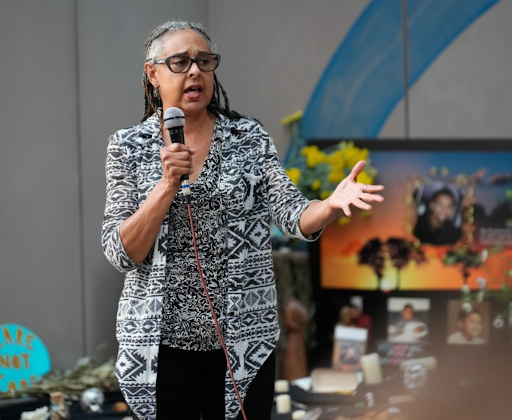
By Genoa Barrow, The Sacramento Observer
It’s not uncommon to see people waiting outside the Sacramento County Jail – typically Jehovah’s Witnesses offering religious reading material, or relatives and girlfriends providing rides for someone who is about to be released.
Members of a local grassroots group also frequently gather near the downtown facility, also known as the main jail, speaking on behalf of people who remain inside, those who will hopefully make it home and others who will never have the chance to.
In May, Decarcerate Sacramento held a candlelight vigil, “For Hope & Healing,” outside the main jail to urge the powers that be to address growing concerns about the welfare of people housed there. Group leaders also called attention to people who have died while in custody at the jail. At the time Liz Blum, the nonprofit’s co-founder, said four people had died in Sacramento County jails this year. At least two more have died since. The numbers could be even higher, as the Sheriff’s Office also has come under fire for failing to disclose several in-custody deaths before they were reported by area families or local news entities.
The number is expected to increase by one. An area man, Tyus Hutton, was admitted to Sutter Medical Center from county jail in late August in critical condition. The extent of the 25-year-old’s injuries and what caused them remains unclear. Hutton’s parents, Ted Gayfield and Talina Hutton, say they were urged to take him off life support in efforts to “cover up” what occurred.
The attorney said officials have maintained that they can’t release information because Hutton still is technically incarcerated.
“Sacramento County jails are deadly, dehumanizing and perpetuate violence every single day,” said Jael Barnes, a pretrial justice organizer with Decarcerate Sacramento.
During vigils and other awareness efforts, Barnes calls out the names of those who have died while in custody at the county jail. Among them are several who passed away in 2018 – George Knox, Brandon Smith, Donald Bell, and Marshall Miles who, like George Floyd and Eric Garner, told officers he couldn’t breathe before dying. Deputies were seen on body camera footage warning Miles to “stop acting silly” while transporting him to the jail.
Events such as For Hope & Healing help “put it in people’s faces,” Barnes said.
“They need to know what the hell is going on. It’s the only way we’re going to bring change,” said Barnes, whose husband was incarcerated at the main jail before being transferred to an out-of-state facility.
Sacramento County officials say they are in “partial” compliance with a 2020 Mays Consent Decree that requires them to address many of the issues activists consistently call out, specifically reducing jail population, improved medical care and mental health services and staffing inadequacies.
“The county has made progress in areas such as decreased jail bed contracts by other agencies, increased pretrial and collaborative courts programs, reentry programs, intensive outpatient programs and a new subacute facility,” reads a statement to The OBSERVER.
“The county acknowledges that more work is needed. Out-of-cell time, booking time and treatment compliance is difficult to nonfeasible within the current facility.”
The Board of Supervisors voted 3-2 on Aug. 8 to move forward with expansion plans, despite opposition from Decarcerate Sacramento.
In May, behavioral health advocate Tamra Lacey shared her experiences in trying to get help for her grandson, who spent two years in the main jail before being released days before the vigil.
Lacey said her grandson suffers from mental health and emotional issues stemming from trauma as a teen. He later went off his medication and became homeless.
She alleged that medical assistance was given to her grandson only on the morning of his release.
“Maybe they were afraid that my grandson would tell the outside world what’s going on in there,” Lacey said. “The criminal justice system is broken. We already know that people are in here that should not be in here. We know that mental illness and homelessness is being criminalized – even substance use disorders. People want help, but there’s not enough programs. That’s where our money needs to be, not in jail expansion that will never serve those that require care.”
This article first appeared on The Sacramento Observer.


